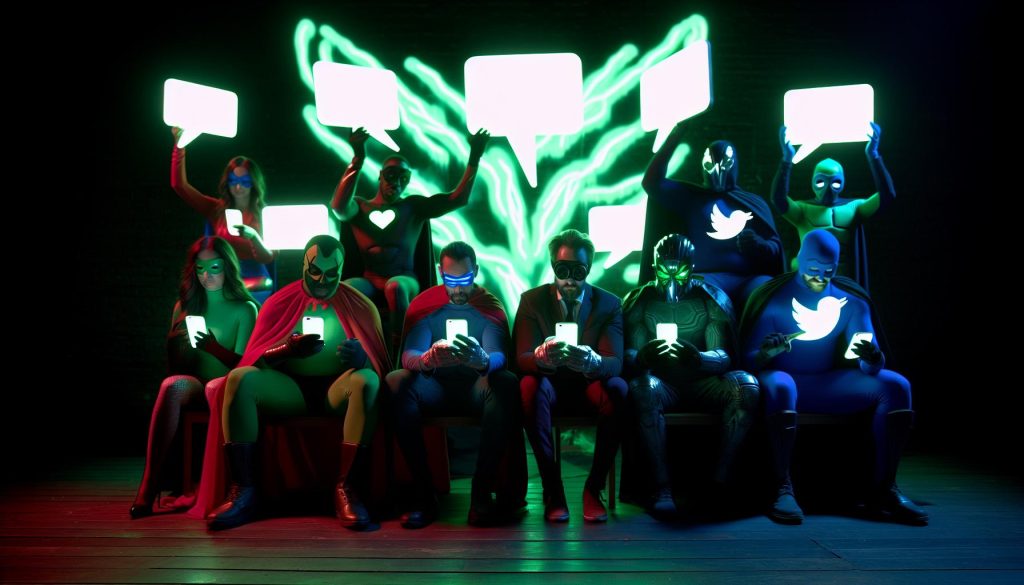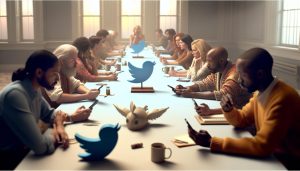Imagine even your favorite superheroes facing their worst fears-internet trolls! In “Marvel Mean Tweets: When Superheroes Face Their Kryptonite,” we dive into the hilarious and often cringeworthy realm of comic book legends reading out brutal, honest tweets about themselves. This playful take on social media culture not only highlights our obsession with celebrity but also sheds light on how even the mightiest heroes are vulnerable to criticism. As we explore these viral moments, you’ll discover the intersection of humor and humanity, sparking conversations around body positivity and the importance of mental health in a meme-driven world. So, get ready to enjoy a good laugh while gaining insights into the evolution of online interactions with your favorite Marvel heroes!
Marvel’s Mean Tweets: The Funniest Superhero Roasts
In the vibrant world of Marvel, where superheroes like Spider-Man and Iron Man often save the day, it’s refreshing to see them confront the lighter side of fame through the lens of Twitter’s “Mean Tweets.” Here, they roast and get roasted, embodying the playful spirit of internet humor that fans love. These humorous exchanges aren’t just entertainment; they encapsulate the relatable nature of these larger-than-life characters, demonstrating that even the mightiest can chuckle at themselves.
One of the funniest aspects of these interactions is how they provide a clever commentary on superhero tropes and cultural expectations. For example, imagine Captain America’s perfect physique paired with a tweet lamenting, “Why is Cap always so righteous? He never even takes a break to eat pizza!” This not only stirs giggles but also toes the line between admiration and playful critique-reminding viewers that heroes, while noble, are not above a good-natured jab. In this digital arena, fans and characters alike share a common bond, navigating the complexities of fame and expectation.
The satire doesn’t stop at light-hearted jabs; it opens up a dialogue about the essence of heroism. Characters responding to their mean tweets often highlight their flaws or insecurities, fostering a sense of vulnerability that fans can relate to. When Thor quips back to a tweet about his questionable haircut by admitting he loses a few strands during battles, it not only elicits laughter but also humanizes him, bridging the gap between godly strength and everyday struggles.
In this playful exchange, superheroes harness the power of humor to connect with their audience, proving that laughter can be just as mighty as the Hulk himself. Whether you’re a casual viewer or a die-hard fan, these “Mean Tweets” highlight the delicious irony of powerful beings engaging in the very human act of roasting. Keep an eye on these interactions; they’re a key part of what makes superhero stories so captivating-balancing the epic with the relatable, the serious with the silly. Embrace the banter and join in on the fun!
The Psychology Behind Mean Tweets and Humor
In the digital landscape of memes and viral tweets, there’s something irresistibly entertaining about the juxtaposition of superheroes, mighty as they are, engaging in playful banter on social media. This phenomenon, particularly exemplified through the lens of “Mean Tweets,” taps into deeper psychological principles that make humor a powerful tool for connection. It not only breaks down the facade of invincibility that heroes possess but also speaks to our universal experiences with criticism and self-identity.
Humor, especially in the form of mean tweets, allows both fans and characters to explore themes of vulnerability and relatability. When superheroes respond to snarky remarks about their costumes or questionable choices, they highlight their own insecurities. Consider a quip from Black Widow addressing a tweet about her combat skills: “I can’t wear white after Labor Day? Talk to me after I save the world in these shoes!” Such exchanges reveal the everyday challenges even extraordinary beings face, resonating with fans who might grapple with their insecurities, thereby fostering a rich, shared dialogue about human flaws.
Moreover, the use of sarcasm and wit in these interactions serves as a coping mechanism. Psychologically speaking, humor often provides relief from life’s stresses, offering a way to process and diffuse criticism. Social media platforms amplify this effect, creating spaces where fans can engage in witty repartee, blurring the lines between idol and average Joe. Think of it as a two-way street: while fans critique heroes, heroes’ comebacks create a sense of community grounded in laughter and shared experiences.
Finally, the unpredictable nature of humor in these formats encourages creativity and participation among users. Fans often join the conversation, adding their own takes or expanding on heroes’ jokes, which not only enriches the content but also elevates social bonds. As the humor evolves, so too does the narrative of superhero identity, reflecting contemporary culture and its embrace of authenticity and imperfection. So next time a superhero takes a jab at a mean tweet, remember, it’s more than just a punchline; it’s a reflection of our collective journey navigating the unpredictability of life and the humor we find in it.
Top 10 Epic Superhero Responses to Mean Tweets
Marvel superheroes responding to mean tweets is a whirlwind of wit that encapsulates the transformational power of humor in pop culture. Social media, particularly Twitter, has birthed a platform where our favorite characters can showcase their comedic chops, turning stinging criticism into laughter. Whether it’s a roast about a bad costume or a quip regarding their choice of sidekick, these responses give heroes a slice of humanity that fans adore. Here’s a look at some of the most epic comebacks that illustrate this hilarious crossover between heroism and humor.
- Spider-Man: When someone tweeted, “Is your only superpower getting stuck in cobwebs?” Spidey fired back with, “Nah, I’ve mastered the art of awkward landings too!” His response not only showcases his self-deprecating humor but also reveals the realistic challenges he faces even in the face of danger.
- Deadpool: Always ready with a comeback, Deadpool took a jab from a user who said, “Why do you keep wearing that ugly costume?” with a cheeky, “It’s called a fashion statement, sweetheart. Ever heard of it?” This encapsulates not just his ridiculousness but his love for blurring the lines of traditional superhero ethics.
- Thor: A tweet accusing him of being a “long-haired pretty boy” received the thunder god’s thunderous reply: “Well, at least I’m prettier than your profile pic!” Thor’s playful embrace of his aesthetics adds levity to the warrior within.
- Black Widow: Facing a tweet about her choice to wear red while in stealth mode, she cheekily replied, “Red is the color of danger, darling! Didn’t you know?” Connecting her fighting style with fashion sends a huge message about confidence.
- Iron Man: Responding to a tweet stating, “A tin can can’t save the world,” Iron Man quipped, “Better a tin can than a paper cup-at least I’m durable!” This perfectly exemplifies his trademark sarcasm and wit.
- Hulk: Dealing with a user who said, “Hulk smash, but there’s no brains in that head!” he humorously answered, “Hulk smash…and also read books sometimes!” This response highlights Hulk’s unexpected depth and gives fans a good laugh.
- Ant-Man: A fan poked fun at his size, saying, “Is being small a superpower?” Ant-Man promptly replied, “Proves that good things come in small packages. Just ask my bank account!” He manages to turn a slight on his size into a clever endorsement of the advantages of being nimble.
- Captain America: After being told he should stick to the ’40s, he countered, “But the vintage look never goes out of style!” This showcases not only his confidence but also his ability to stand tall amidst criticism.
- Doctor Strange: Responding to a tweet about his teleportation skills, he humorously rebutted with, “Teleportation saves time; it’s not my fault you don’t know how to practice patience!” This message not only promotes a humorous charm but also hints at deeper lessons about mindfulness.
- Wolverine: Confronted with “Those sideburns are a fashion crime!” he growled back, “Only if you’ve never been in a bar fight. Try me!” His tough persona shines through, transforming a critique into a badge of honor.
These quick-witted exchanges not only entertain but also build a sense of community among fans who share a love for both superheroes and humor. They exemplify how vulnerability can be embraced within the superhero realm, allowing characters to connect with their audiences in ways that traditional storytelling might not accomplish. So, the next time you catch a superhero throwing shade on social media, remember, those roasts are all about keeping it real and relatable!
How Social Media Influences Superhero Perceptions
The emergence of social media has fundamentally transformed how we perceive superheroes, with platforms like Twitter serving as the new stage for these iconic characters to engage with audiences in real time. This dynamic interaction offers fans a unique glimpse into their personalities, making them feel more relatable and alive. No longer confined to the pages of comic books or the big screen, superheroes can now respond instantly to public opinions, criticisms, and humor, making their personas even richer and more complex.
Take, for example, the phenomenon of “Mean Tweets.” This viral trend showcases superheroes encountering humorous jabs from fans, which not only entertains but humanizes these larger-than-life characters. By addressing mean tweets with witty comebacks, heroes like Deadpool and Spider-Man reveal vulnerabilities that resonate with fans, fostering a deeper emotional connection. Their roasts highlight an essential aspect of superhero narratives: the ability to face adversity-even in the form of public criticism-with a sense of humor. This bravado can make even the most formidable villains seem less intimidating while enhancing the heroes’ relatability.
In this social landscape, humor serves as a powerful tool for engagement. It allows franchises to cultivate a fan community that thrives on interaction. When superheroes react to critiques, they transform potential negativity into playful banter, which often sparks further conversation among fans. A simple tweet can go viral, influencing how subsequent comic book plots or film adaptations are received. These exchanges illustrate how social media not only shapes the narrative surrounding superheroes but also empowers fans to participate actively in character development.
Furthermore, social media’s immediacy means that superhero perceptions can shift overnight based on trending topics or viral challenges. For budding creators and fans alike, staying aware of these trends is essential for understanding audience sentiment. Platforms like Twitter are crucial for monitoring what resonates, providing insights into character popularity and the cultural relevance of storylines. As superhero narratives increasingly incorporate real-world issues, humor, especially when wielded deftly, becomes a significant point of connection between characters and their diverse audiences, reinforcing that even heroes face momentary kryptonite in the form of public scrutiny.
Behind the Scenes: Crafting the Perfect Superhero Roast
Crafting the perfect superhero roast is like plotting the ultimate comic book arc-it’s all about timing, wit, and that sprinkle of audacity. Imagine the thrill of watching Deadpool or Spider-Man take aim at a jab from the internet, transforming a potential insult into a celebration of their quirky charm. These roasts don’t just happen; they’re meticulously designed to resonate with fans while showcasing the human (or superhuman) side of these characters. Behind the scenes, writers and social media strategists employ a unique blend of humor and relatability to pull off these viral moments.
At the heart of a stellar roast is the context. Writers must understand both the character’s personality and the tone of the original tweet. For instance, tweets targeting Iron Man might tease his tech obsession or arrogance, while those aimed at Captain America could focus on his old-fashioned ways. Crafting a reply that feels authentic to the character helps maintain continuity in the overall narrative-a crucial aspect that dedicated fans appreciate. Here’s how the roasting process generally unfolds:
- Research the Roast: Dive into Twitter trends and popular memes. What are fans saying? What themes or jokes are already circulating?
- Stay True to the Character: Make sure the reply matches the superhero’s established persona. Would Iron Man use sarcasm or humor? Would Spider-Man deliver a light-hearted quip?
- Timing is Key: In the fast-paced world of Twitter, quick reactions can make all the difference. The sooner a superhero can respond, the more relevant-and hilarious-their roast will be.
- Create Engagement: Encourage fans to join in on the fun by asking for their own roasts or reactions. Building a community around humor increases engagement and keeps conversations vibrant.
Accessibility is also crucial. Social media humor should be digestible yet clever. Memes and GIFs can complement the text, making the response visually engaging. When superhero roasts go viral, it’s often due to a combination of clever writing, timely responses, and a great dose of meme culture that keeps the audience laughing.
As these exchanges evolve, they underscore the importance of vulnerability in superheroes. By leaning into humor-especially when faced with criticism-these characters become more relatable. They remind us that even icons can take a hit (or a witty jab) and still bounce back with style. The behind-the-scenes effort of crafting the perfect roast not only entertains but deepens the connection fans feel with their favorite heroes. So, the next time you laugh at a superhero’s comeback, remember: it’s not just about the joke-it’s about the artistry behind it.
The Impact of Humor on Comic Book Characters
In the fast-paced world of Twitter, humor has become a vital tool for superheroes to connect with fans and humanize their larger-than-life personas. These mean tweets aren’t just for laughs; they’re a clever way to maintain a dialogue with audiences, reflecting the complexities of characters who, despite their powers, grapple with real-world issues-such as cyberbullying, self-image, and societal expectations. When Deadpool responds to a snarky comment about his attire or Iron Man quips about his tech obsession, it underscores the characters’ self-awareness and ability to take a joke, bridging the gap between fiction and reality.
The power of humor lies in its relatability. Fans often find solace in knowing their heroes face criticisms just like themselves. Superheroes navigating mean tweets can be likened to a masterclass in vulnerability. By embracing humor, they acknowledge that not everything is epic battles and world-saving; sometimes, it’s about handling playful jabs about their outfits or quirkiness. Such moments help fans forge emotional connections, seeing their beloved characters as multifaceted beings who don’t just excel in heroics but can also laugh at themselves.
Interestingly, the impact of humor extends beyond mere chuckles; it reshapes how comic book characters are perceived. Witty retorts and light-hearted exchanges can transform a hero’s narrative from a rigid archetype into a dynamic entity. For instance, Spider-Man’s humorous comebacks during intense battles have long been a hallmark of his character, making him relatable while also enhancing his appeal. Fans appreciate that their heroes are not just invincible; they’re capable of feeling discomfort and responding to it with wit.
Moreover, the nature of social media facilitates a unique feedback loop. When superheroes engage with fans through humor, they foster an inclusive community where everyone feels invited to join in on the fun. This two-way engagement keeps comic book narratives fresh and relevant, allowing characters to evolve in line with contemporary social dynamics. Superheroes faced with mean tweets aren’t just battling their foes; they’re tackling the ups and downs of internet culture, making them more accessible and easier to connect with in a world where humor can often be a healing balm.
Fan Reactions: Love It or Hate It?
In the realm of social media, fan reactions to superheroes’ mean tweets can be as polarized as the heroes themselves. While some fans roar with laughter at the witty exchanges, others raise an eyebrow, questioning whether the humor diminishes the seriousness of the characters. Superheroes like Deadpool and Iron Man have mastered the art of the roast, but not all fans appreciate this cheeky banter. Many see it as a refreshing change that humanizes these larger-than-life figures, making them relatable. However, with every LOL-inducing thread, there exists a faction that feels these playful jabs undermine the gravitas of heroic narratives.
The Divided Landscape of Humor Appreciation
- Love It: Fans who embrace the humor often cite that it adds depth to characters, showcasing their personality beyond the typical hero archetype. Deadpool’s irreverent response to a mean tweet about his costume is not just funny-it’s a testament to his character’s self-awareness, making fans feel that their favorite heroes have struggles that resonate with them.
- Hate It: Conversely, some purists argue that humor may trivialize serious story arcs or themes. They believe that superheroes should remain paragons of virtue, not engage in playful banter that could be seen as mocking their missions to save the world.
Social Media’s Role in Amplifying Reactions
Twitter serves as a significant barometer for these reactions. A quick scroll through popular posts reveals a rich tapestry of comments-some rolling on the floor with laughter, while others launch into a critique. This diverse fan reaction showcases how contemporary superhero narratives must walk a fine line; engaging humor can foster connection, but it also risks alienating part of the fanbase. It illustrates a fascinating dynamic: as humor evolves, so do the expectations placed on these iconic characters in the public sphere.
Engaging with the Community
For fans caught in the whirlwind of opinions, here are some tips on navigating this vibrant yet sometimes divisive culture:
- Join the Conversation: Engage with other fans online. Platforms like Twitter and Reddit are perfect for sharing your thoughts and discovering new perspectives. Use hashtags related to your favorite heroes to see trending discussions.
- Share Your Own Takes: Whether you love the humor or think it’s misplaced, voicing your opinion can spark interesting debates. Create memes or threads that express your viewpoint on superhero humor.
- Stay Inclusive: Understand that everyone has their preferences. Just as some love the snark of Deadpool, others prefer the gravitas of characters like Captain America. Embrace the diversity within the fandom!
As superheroes continue to tackle the matter of mean tweets, the fan reactions will only grow more colorful and diverse. It’s this unpredictability that keeps the discussions lively and ensures that no matter the reception, humor will remain an integral part of the superhero narrative, reflecting our world as much as theirs.
Superheroes vs. Critics: A Cultural Commentary
In the ever-evolving arena of superhero storytelling, the clash between fan expectations and critical evaluation often takes center stage, especially in the digital age where humor reigns supreme. While traditional comic narratives painted superheroes as shining paragons of virtue, their antics on platforms like Twitter-like meme-worthy roasts and playful comebacks-leave both fans and critics in a heated debate. The phenomenon of superheroes responding to mean tweets showcases not just their funny sides, but reflects a broader commentary on societal norms and the changing landscape of entertainment.
The dialogue around superhero humor is not merely about jokes but rather how these characters fit within a contemporary framework that values relatability over unattainable perfection. Superheroes like Deadpool leverage humor to reveal vulnerabilities, acting as a mirror to audiences grappling with their own insecurities. This playful banter can deepen our connection to these characters, allowing us to see them as more than just icons. Critically, however, some argue that such humor can dilute the gravity of the heroic journey, transforming serious narratives into mere punchlines. This tension encapsulates a cultural shift-one that prompts us to question how we define heroism in an age where authenticity trumps idealism.
Critics often contend that humor undermines the foundational tenets of what it means to be a hero, fearing that levity will overshadow significant themes inherent to superhero lore. They challenge the notion of humor as a vehicle for depth, positing that it risks trivializing struggles against profound threats. Yet, to dismiss this comedic approach overlooks how it can serve as a coping mechanism, allowing fans to engage with difficult subjects while still having a collective laugh. The key is balance: while humor can soften the edges of dark narratives, it must be judiciously applied to retain the essence of heroism.
As you navigate this complex landscape of opinions, consider joining the conversation. Explore trending hashtags on Twitter that revolve around mean tweets and superhero interactions. Analyze what resonates and what doesn’t with fellow fans. Learn to articulate your own viewpoints about this mix of humor and heroism, as your unique perspective can contribute to an enriching dialogue. Embrace the duality of love and critique, as both are essential in shaping the dynamic evolution of our beloved characters.
Exploring Twitter’s Role in Shaping Superhero Narratives
In a world where superheroes once epitomized courage and valor, Twitter has flipped the script, adding a witty twist to their narratives. The social media platform has become a digital playground where beloved characters can take a break from fighting villains to roast their detractors, showcasing their humorous sides in the process. This engagement not only entertains fans but also invites them to participate in a conversation about what it means to be a superhero in the age of memes and viral content.
The Power of Mean Tweets
Mean tweets serve as a unique crossroads between traditional comic book storytelling and contemporary humor. When superheroes like Spider-Man or Captain Marvel respond to critics in clever and snarky ways, it humanizes them, making them relatable to fans. Suddenly, these larger-than-life characters grapple with the same absurdities of internet culture that we all encounter, highlighting a shared human experience. Fans can enjoy the humor while also seeing these heroes navigate a digital landscape reminiscent of their own daily lives.
Crafting Engagement through Humor
One might wonder how superheroes maintain their integrity while tossing out zingers on Twitter. The answer lies in careful craftsmanship of their online personas. Behind every snarky tweet is a thoughtful approach to character development that reflects broader societal norms and issues fans care about. For example, when a hero playfully addresses a critique about their outfit, they’re not just responding to mean tweets; they’re reinforcing their relatability and ability to laugh at themselves.
For those keen on navigating this space, here are some tips:
- Follow trending hashtags: Engage with the discourse around superheroes by searching for hashtags related to your favorite characters. This will immerse you in ongoing conversations.
- Join the dialogue: Don’t just read the tweets-reply, quote, or retweet to express your thoughts and connect with fellow fans. This interaction can enhance your social media experience.
- Stay updated on meme culture: Understanding current trends allows you to appreciate and contribute to the humor surrounding your favorite heroes.
With such playful banter online, it’s essential to remember that humor can bridge the gap between fans and their heroes, further enriching the narratives. This blend of comedy and heroism invites fans to explore deeper meanings behind jokes, making each tweet a potential gateway into discussions about identity, vulnerability, and the nuances of being a hero in an imperfect world.
Lessons in Vulnerability: Superheroes Exposed
Imagine your favorite superhero, clad in spandex and saving the world one day, and the next, they’re scrolling through Twitter, chuckling at mean tweets about their latest movie. It’s a wild ride but one that speaks volumes about vulnerability, both for these towering figures and their adoring fans. The everyday banter reflects not just the light-hearted side of these characters, but a deeper narrative about facing critiques-because let’s face it, even superheroes have their kryptonite, and sometimes, it’s the internet.
When superheroes engage with “mean tweets,” they’re stripping away the armor of perfection that often surrounds them. Instead of the usual bravado, they reveal a layer of self-awareness that resonates with many. For instance, when Thor jokes about his long hair or Iron Man quips about being a “genius, billionaire, playboy, philanthropist” as a way to deflect a snarky comment, they acknowledge their flaws, making them relatable. This humanizing moment can invite fans to embrace their own imperfections, showing that even in their struggles, it’s okay to laugh and learn.
Engaging with Vulnerability
How can fans join in on this conversation of vulnerability while navigating their social media experience? Here are some handy tips:
- Share Your Own Roasts: If superheroes can take a jab at themselves, why can’t you? Use humor to address your own quirks on social media. This approach gets you noticed and humanizes your online persona.
- Follow the Fun: Stay updated on popular Twitter threads related to superhero discussions. Real-time engagement gives insight into how others share their vulnerabilities and jokes about them.
- Be Respectful: While banter is fun, remember that humor should be light-hearted. Ensure your comments don’t perpetuate negativity, as we all know how it feels to be on the receiving end of a mean tweet.
Delving into the culture of “Mean Tweets” isn’t just about laughs-it’s about learning to cope with criticism while celebrating individuality. By embracing the vulnerabilities that superheroes model, fans can create a more supportive and humorous online community that champion’s both laughter and honest self-reflection. So, the next time you see a superhero roast back, remember: they’re leading by example, reminding us all that it’s totally fine to laugh at ourselves and grow in the process.
Future of Superhero Humor: Trends and Predictions
The delightful chaos of superhero humor is evolving, especially as we delve deeper into the world of social media. As we witness the hilarity of mean tweets about our favorite heroes, it becomes clear that the landscape of superhero humor is just as dynamic as the characters themselves. The fusion of social media platforms, meme culture, and the ongoing dialogue between fans and creators is set to redefine how we perceive humor within this genre.
Just imagine superheroes hopping on trending topics or participating in viral challenges. With platforms like TikTok and Instagram leading the charge, we can expect to see formats that enable quick-witted exchanges, where superheroes can roast themselves while also engaging with fans. For instance, future superhero films and series might integrate interactive elements where viewers tweet live reactions, and characters directly respond in character, creating a blend of media that brings both big-screen narratives and social media culture together. This could enhance the relatability of these larger-than-life figures, allowing for a more genuine connection with their audience.
Moreover, the “mean tweet” phenomenon could evolve into full-fledged comedic sketches or segments within superhero narratives. Picture a superhero comedy feature that incorporates live social media commentary, featuring real-time reactions to scenes from earlier episodes or movies. This approach not only adds layers to the storyline but also keeps the humor fresh and relevant. More creators might enlist social media personalities, influencers, or even fans as voice characters, turning critiques into laughter and reinforcing the idea that humor is a collective experience.
As these trends unfold, fan engagement will likely become a focal point of future superhero humor. The rise of digital platforms provides a unique space where feedback is instant and often hilariously blunt. Brands and creators are already recognizing the value of listening to their audiences and incorporating that into their storytelling. Expect to see characters that mirror the quirky, sometimes savage, humor of their fans, making humor reflect the cultural zeitgeist in a more significant way. Instead of posing on pedestals, these superheroes will be down in the trenches with their fans, experiencing the wild ride of social media together.
In a nutshell, as humor continues to evolve within the superhero universe, it will remain a crucial element in humanizing these beloved characters. The ability for superheroes to laugh at themselves-and be laughed at-will pave the way for new narratives that champion authenticity, relevance, and collective joy. So, buckle up and get ready to witness the heartwarming hilarity that lies ahead in the multifaceted realm of superhero humor.
Why Comic Book Fans Embrace Mean Humor
In a world where superheroes leap tall buildings and save the day, it’s refreshing to see them take a moment to laugh at themselves-especially when it’s in the form of mean tweets. This comedic trend resonates deeply with comic book fans, who often tread the fine line between admiration and playful critique. The beauty of mean humor lies in its inherent ability to humanize iconic figures. Rather than worshiping their heroes from a pedestal, fans appreciate when these larger-than-life characters engage in self-deprecation, making them feel relatable. In a realm dominated by epic battles and shocking plot twists, such a light-hearted genre offers a delightful reprieve, allowing fans to bond over shared laughs.
Shared Experiences and Community
The embrace of mean humor isn’t just about individual enjoyment-it’s a shared experience that cultivates a sense of community among fans. When superheroes respond to biting criticisms with wit, it sparks conversations and conversations with an entirely new flavor. Comic book enthusiasts hop online to exchange their favorite mean tweets, remix them into memes, or create skits that reflect the humor. This collaborative spirit not only strengthens fan bonds but also amplifies the impact of mean tweets in popular culture. It’s a unique sort of alchemy where laughter becomes a common language that bridges differences and unites fans worldwide.
Engagement with Pop Culture
Fans today are digital natives, navigating spaces like Twitter with a savvy sense of meme culture and internet humor. Mean tweets allow superheroes to engage with ongoing pop culture dialogues. Superheroes aren’t just characters in stories-they’re influencers in their own right, and their embrace of meme-worthy banter reflects their awareness of and integration into current trends. This interaction keeps them relevant and fun, providing fans with modern-day parables that resonate with their experiences outside the comic book realm.
Turning Critique into Comedy
Part of the allure of mean tweets is their ability to turn critique into comedy. Fans often have opinions on their favorite characters’ choices-whether it’s a questionable costume, a dubious plot twist, or an evolution in character. When superheroes use social media to poke fun at themselves regarding these critiques, it not only showcases a healthy acceptance of feedback but also turns the tables on traditional fandom dynamics. Instead of merely accepting or dismissing critiques, characters become active participants in the conversation, enhancing their narrative depth and allowing fans to feel a part of the superhero journey.
Ultimately, the appeal of mean humor lies in its power to foster connection in a digital age where authenticity is treasured. As fans laugh alongside their favorite heroes, they don’t just appreciate them as characters in stories-they celebrate them as relatable partners in the shared human experience of navigating life’s quirks.
Q&A
Q: What are some memorable moments from Marvel’s Mean Tweets series?
A: Marvel’s Mean Tweets series features many hilarious moments where superheroes respond to outrageous tweets. Notable highlights include Iron Man quipping about his ego and Captain America reflecting on his outdated views. These moments blend humor and character personality, showcasing how heroes handle criticism while engaging with fans.
Q: How does humor in Mean Tweets affect superhero portrayal?
A: Humor in Mean Tweets adds a layer of relatability to superheroes, showcasing their vulnerabilities and flaws. It humanizes larger-than-life characters, allowing fans to see them in a new light. This comedic approach contributes to a more nuanced understanding of their personalities beyond typical heroic actions.
Q: Why do fans enjoy Marvel’s Mean Tweets?
A: Fans appreciate Marvel’s Mean Tweets because they mix comedy with beloved characters, creating a fun and engaging experience. The tweets provide an opportunity for fans to witness their favorite heroes’ responses to real-world commentary and criticisms, fostering a deeper connection to the characters.
Q: How has Twitter influenced superhero humor?
A: Twitter has significantly influenced superhero humor by serving as a platform where fans can express opinions and interact directly with creators. This instant feedback loop allows writers to incorporate contemporary themes into characters’ responses, further blending comic book narratives with current social issues and trends.
Q: What are some criticisms of the Mean Tweets format?
A: Critics argue that Mean Tweets can undermine the seriousness of superhero narratives by trivializing character depth. Some believe that focusing on humor might alienate fans who prefer traditional story arcs. However, others view this approach as a clever way to balance lighter content with classic superhero themes.
Q: How do superheroes respond to their critics on social media?
A: Superheroes in the Mean Tweets series often respond with wit or light-hearted banter, showcasing a blend of self-awareness and humor. These responses can reflect their character traits and provide fans with insights into how these fictional heroes handle public scrutiny and fan engagement.
Q: What lessons can be learned from superhero interactions on social media?
A: Superhero interactions on social media teach important lessons about vulnerability and self-deprecation. They highlight that even the mightiest can experience doubt and criticism, encouraging fans to embrace their flaws and find humor in challenging situations. This approach can foster positive discussions within the fan community.
Q: How is the future of superhero humor evolving?
A: The future of superhero humor is evolving to embrace more diverse perspectives and digital platforms. As social media continues to shape narratives, we can expect to see increased incorporation of interactive humor that resonates with younger audiences. This trend may also lead to a better balance between comedy and dramatic storylines, reflecting modern sensibilities.
To Wrap It Up
Thanks for joining us on this hilarious journey through “Marvel Mean Tweets: When Superheroes Face Their Kryptonite.” We’ve seen that even the mightiest heroes can’t escape the playful jabs of Twitter! If you enjoyed this blend of humor and fandom, don’t miss out on our deep dives into viral trends and social media antics-check out our posts on Twitter culture and the art of creating viral content.
Ready to continue the fun? Sign up for our newsletter for exclusive tips on navigating the chaotic world of social media, and dive into our tutorials for maximizing your Twitter experience while keeping your followers engaged. Got thoughts on your favorite superhero roast? Share your comments below and join the conversation! Together, let’s keep the laughs rolling and discover more delightful insights that celebrate the intersection of internet culture and superhero fandom. Stay tuned for more!











